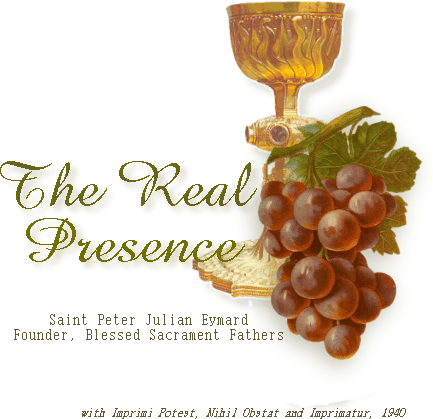 THE EUCHARIST, A NEED OF OUR HEART Fecisti nos ad Te, Deus! Thou hast made us for Thee, O my God! (Saint Augustine.) WHY is Jesus Christ in the Eucharist? Many answers could be given to that question. The one that sums them all runs as follows: because He loves us and because He wants us to love Him. Love, that is the motive for the institution of the Eucharist. Without the Eucharist Christ's love would be nothing more for us than a lifeless love, a love of the past, which we would quickly forget and which it would be almost excusable for us to forget. Love has its laws, its requirements, which the Eucharist alone fully satisfies. On account of the Eucharist Jesus has every right to be loved because in it He gives us a proof of infinite love. Natural love, as God has placed it in our hearts, requires three things: mutual presence or fellowship of life, joint ownership of property, and perfect union. I THE absence of a friend is friendship's affliction, its torment. Separation weakens the strongest friendship and, if it is too prolonged, may end by destroying friendship altogether. If our Lord is not present but keeps at a distance, our love for Him will suffer the dissolving effect of absence. It is in the nature of man and of his love to require, in order to live, the presence of the object of his love. See what happened to the poor Apostles while our Lord was in the grave. The disciples at Emmaus admitted they had almost lost the faith; their good Master was no longer with them. Ah! If our Lord had left us no other pledge of His love than Bethlehem and Calvary, how quickly we should have forgotten Him, the dear Savior! What indifference! Love wants to see, to hear, to converse, to touch. Nothing can take the place of the beloved, neither memories, nor gifts, nor pictures; there is no life in these things. Our Lord was well aware of it. Nothing could have taken the place of His Person. We must have our Lord Himself. But His words? No! We can no longer be thrilled with them; we can no more hear the touching expression of them from the Savior's own lips. His Gospel? It is a testament. Do not the Sacraments confer life? We need the Author of life to sustain it in us. The Cross? No! Without Jesus it is a source of sadness. But hope? Without Jesus it is an agony. Protestants have all these things, and yet how cold, how chilling is Protestantism! Could Jesus have intended to leave us in the sad state of having to live and strive without Him? Oh! We should be too unhappy without the presence of Jesus! Life would hardly be bearable if we had to go through it exiled and alone on earth, forced to deprive ourselves of earthly goods and of life's consolations, while the worldling has everything his own way. But with the Eucharist, with Jesus in our midst, often under the same roof, always there day and night, accessible to all, expecting everybody to come to His Home-----which is never closed-----admitting the poor and calling them with a marked preference, life loses much of its bitterness. He is the good Father in the midst of His children. That is fellowship of life with Jesus. What a fellowship! It uplifts and ennobles us! How the Eucharist facilitates our relations of fellowship with Jesus Christ, our recourse to Heaven and to Jesus Himself. That is truly the sweet companionship of a simple, loving, familiar, and intimate friendship. We had need of it! II LOVE wants joint ownership of property. It wants to share fortune and misfortune. It is in the nature of love-----its instinct-----to give, and to give everything with joy and happiness. Accordingly, with what prodigality and profusion Jesus in the Most Blessed Sacrament gives His merits, His graces, His very glory! How eager He is to give! Does He ever refuse anything? And He gives Himself, to all and for always. He covers the world with consecrated Hosts. He wants all His children to possess Him. Twelve baskets were left over after the multiplication of the five loaves in the desert. Everybody had to be fed. Jesus Eucharistic would like to envelop the world in His sacramental cloud, and quicken all nations with this life-giving water which empties into the ocean of eternity, but only after having quenched the thirst of the last of the elect and given him strength. Jesus Hostia is then ours, wholly ours. III THE tendency of love-----its final tendency-----is the union of two beings who love each other, the fusion of two into one, of two hearts into one heart, of two minds into one mind, of two souls into one soul. Listen to a mother as she presses her child to her breast: "I could eat him!" Jesus is subject to this law of love which He Himself laid down. After having shared our condition, our life, He gives Himself to us in Communion; He dissolves us into Himself. A Divine union of souls, ever more perfect, ever more intimate in proportion to the greater ardor of our desires. In Me manet, et Ego in illo. We abide in Him, He abides in us. We are one with Him until the ineffable union that was begun here below by grace and perfected by the Eucharist is consummated in Heaven in an eternal and glorious union. Love lives therefore with Jesus present in the Most Blessed Sacrament. It shares all that belongs to Jesus. It is one with Jesus. The demands of our heart are satisfied; it cannot ask for anything else.  Contact Us Contact Us HOME---------------THE HOLY EUCHARIST DIRECTORY-----------------------BLESSED SACRAMENT VISITS www.catholictradition.org/Eucharist/real-presence15.htm |